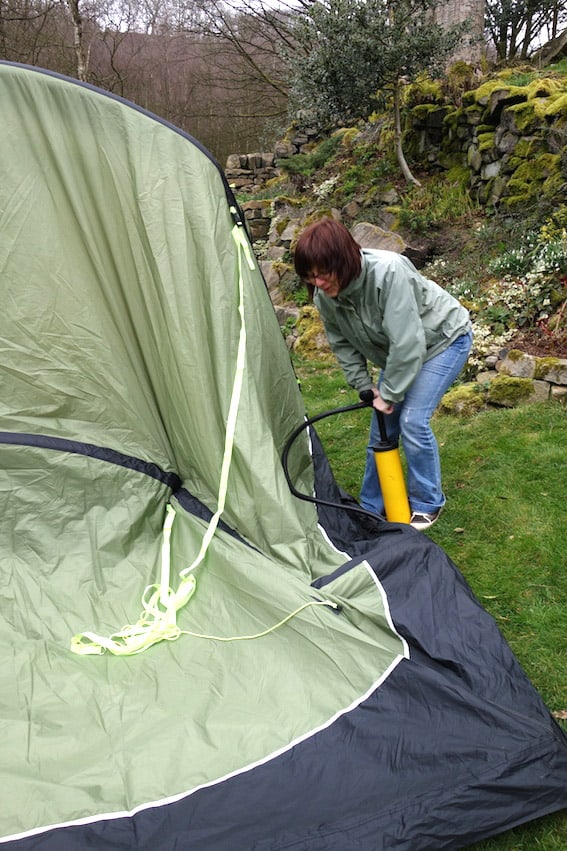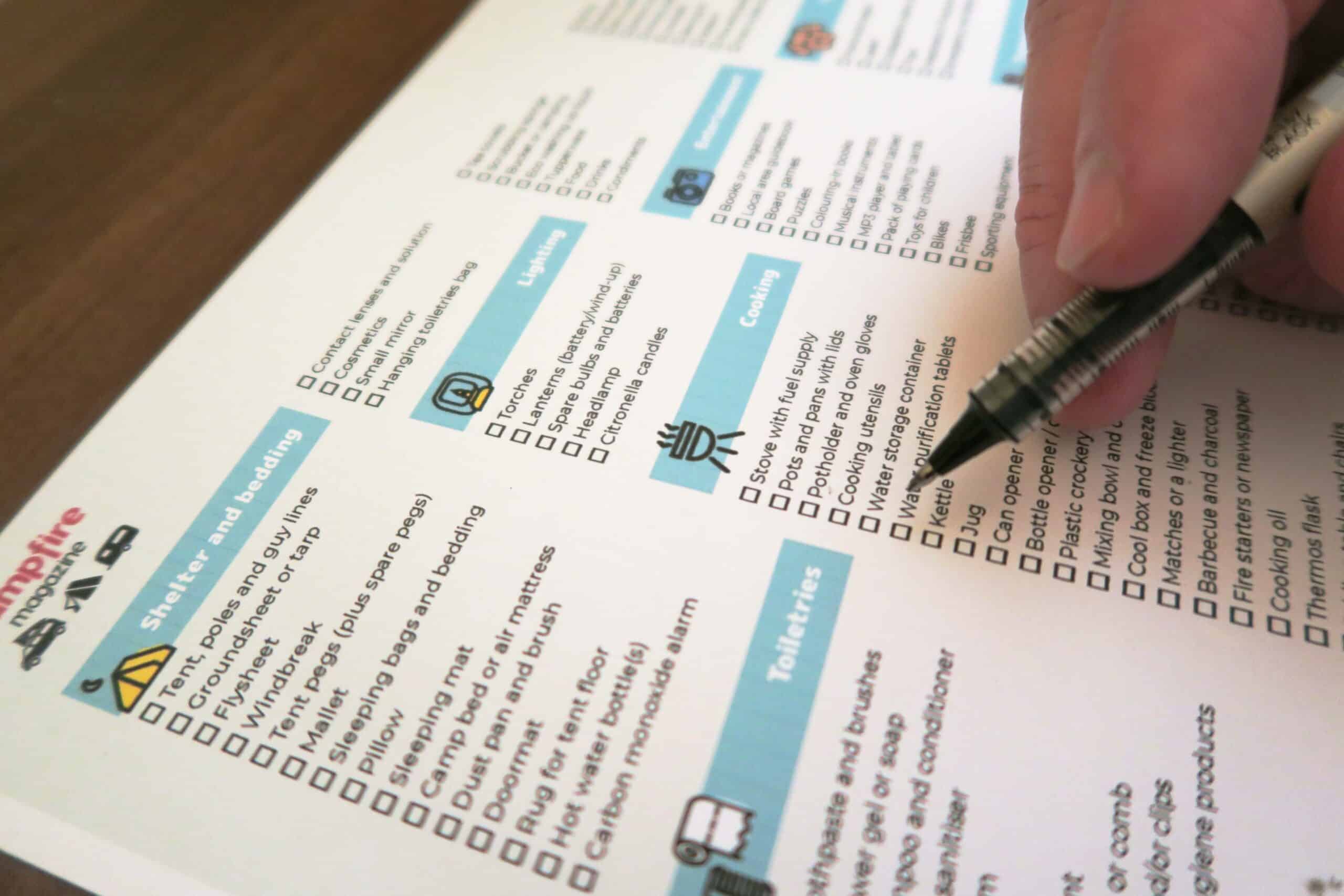When you head off on a camping adventure, there is a lot of equipment that you need to remember to take. But nothing is quite as important as your tent. This will be your home from home while you’re enjoying the great outdoors so you need it to be reliable, durable and well made. But what are tents made from and what is the best material?
Nylon and polyester are among the most popular materials in the manufacturing of modern tents. They’re lightweight, durable and resistant to the weather. The poles of your tent may be made from either fibreglass or aluminium.

When people think of a tent, they may often think of a canvas structure and while this material, along with cotton was frequently used in the past, these are less common today. You can still find them but canvas and cotton tends to be much heavier and this isn’t attractive to the modern camper.
It’s also incredibly important to look not only at the materials from which your tent is made but also the quality of the stitching and construction of the tent. These things will tell you how reliable the tent will be and how fit for purpose it is. So, when purchasing a tent, we would recommend taking the time to look at the materials and design to ensure it will meet your needs; after all, not all tents are made for the same kind of use.
Why Are Polyester And Nylon The Materials Of Choice?
While there are other materials that tents can be made from, you’re more likely to stumble across a tent that is made from polyester or nylon. This isn’t just a random choice of materials from the manufacturer; a lot of thought goes into what will be most suitable and both of these materials have some very desirable qualities.
Cost
If you want to buy a top quality tent then of course, it’s only natural that you’ll get the best that money can buy. However, nobody wants to spend an absolute fortune, especially if they only intend on using their tent very occasionally. That said, you get what you pay for and even sleeping in a tent for a few nights a year that doesn’t do its job is pretty miserable.
But that’s one of the main reasons that polyester and nylon are so sought after in the tent world. They provide the right protection and durability but don’t cost the earth. For the most part, you’ll be able to pick up a nylon or polyester tent for a very affordable price. The only time that we wouldn’t suggest going for something cheaper is if you’ll be taking part in a specialist expedition where the conditions will be extreme.
Weight
For many people, camping is about heading off and exploring and this can often mean hiking to your campsite with your equipment on your back. In this case, the last thing you would want is a heavy tent weighing you down.
But the great thing about polyester and nylon is that they are both incredibly lightweight materials. Even when you’re purchasing a much larger family tent, for example, you will find it to be far less bulky and much easier to transport.
Low Maintenance And Durable
One of the best things about tents made from polyester and nylon is that they are very resistant and will stand up to the challenges that outdoor life throws at them. For example, you will find that tents made from these materials are far less likely to rip or tear so they’re great for real adventurers.
Moreover, nylon and polyester will dry out much more quickly than natural materials making these tents less likely to suffer from mildew and even mould. You don’t need to do very much to take care of them so they’re ideal for people who want a hassle-free camping experience.

Are There Any Drawbacks To Using Nylon And Polyester?
While nylon and polyester are excellent materials for making tents, just like anything else, they aren’t perfect. For most campers, these materials are ideal but there may be some things you should think about before settling on one of these.
Insulation
If you have ever camped in a cotton or canvas tent then you will know how warm they are on a cold night. Similarly, these natural materials will also keep the tent cool on a hot evening. However, man made fabrics like nylon and polyester don’t have this advantage as they aren’t good insulators. This means that it can be tricky to maintain a comfortable temperature inside the tent.
Breathability
Nylon and polyester are man made materials that do not have the same breathability as natural fabrics. This means that it isn’t uncommon for condensation to build up inside the tent which, in extreme cases can even cause puddles.
Noisy
After a long day of activities, you’re going to want to be able to get your head down and have a good night’s sleep. But one of the major problems with man made fabrics is that they are much more lightweight and so may flap around if there’s a breeze. This can be noisy and is a great way to disturb your sleep. Worst case scenario; you’ll need to pack a pair of earplugs.
Loss Of Appearance
While this isn’t one of the worst downsides that a material could have, it is one that’s worth considering. Both polyester and nylon are prone to sun damage and those UV rays are quick to cause a deterioration in the colour and appearance of your tent. What’s more, a lot of exposure can weaken the material.

Cotton And Canvas Tents - The Pros
A lot of people, especially those who haven’t camped in many years, would automatically assume that a tent would be made from canvas or cotton. After all, these were the only materials used for this purpose for many years. These natural materials, canvas in particular, have some excellent properties that make them ideal for the manufacture of tents.
What might surprise you even more is that cotton and canvas tents are pretty much the same thing. Years ago, canvas was crafted using hemp but in modern tent making, it’s made from cotton so regardless of what the tent is advertised as, you’ll get the same benefits from each.
Good Insulation
As we discussed earlier, man made fabrics don’t have the same benefits when it comes to insulation. A canvas tent will regulate the temperature very well inside the tent, keeping you cool when it is hot outside and warm when the mercury drops.
Breathable
If condensation could be a problem, you won’t have any worries when using a canvas tent. This is because this material is much more breathable and so water will not pool. What’s more, canvas has the ability to absorb water which again goes a long way in the battle against condensation.
Quieter
If you’re looking for a peaceful night’s sleep in your tent then choosing canvas may be the right way to go. Unlike nylon or polyester, this is a much heavier material so it won’t flap around as much in the wind, meaning things remain much quieter.
Durability
When you’re using a tent, it’s natural to expect that it is going to clash with the elements and the material needs to be able to stand up to this. The great thing about canvas tents is that they are far more resistant to the rays of the sun meaning that their quality, colour and durability won’t deteriorate, no matter how often you pitch them.
What Are The Downsides To A Canvas Or Cotton Tent?
There are a lot of good points to a canvas tent but much like their man made counterparts, they do have some issues that may affect how useful they are for your camping trip.
Weight
Canvas or cotton tents are much heavier than things like polyester or nylon. This is great in some ways but it can make transporting your tent much more difficult, especially if you will be hiking to your campsite.
Moreover, because of the bulkiness of these tents, you may find it more of a challenge to fit them into the boot of the car. In some cases, you might need to think about getting a larger vehicle in order to fit the tent in.
High Maintenance
One of the biggest drawbacks of a canvas or cotton tent is that they require a lot more maintenance than man made materials. Primarily, you’ll need to consider the fact that the tent will need to be weathered before you can use it. This process involves using a hose on the tent or pitching it in the rain.
This means that the canvas will expand any holes in the stitching are filled making the tent fully waterproof. While this is an effective process, it does take up some time. Moreover, since the material absorbs water, it will take longer to dry out so you’ll need more time at the campsite when you’re packing up.
Less Durable
While canvas tents are quite heavy and bulky, this doesn’t mean that they are so durable. This material is much more likely to tip or tear than a man made fabric so it isn’t as good if you’re camping in extreme environments with a lot of wild growth that could catch on the tent.
Cost
Canvas and cotton tents often cost a lot more than man made fabrics so you’ll need to be willing to make more of an investment when making a purchase. If you’re looking for something affordable for occasional use then this might not be the best option.
Which Material Is The Most Waterproof?
When choosing a tent, one of the most important things you will think about is whether it will protect you from the elements. Nobody wants rain water dripping through in the middle of the night. The good news is that all modern tents are waterproofed in some way although the truth is that the quality of this waterproofing will vary according to the manufacturer and the type of material used.
When you buy a man made fabric tent such as polyester or nylon, you’ll notice that it features a waterproof coating. Not only will this make the material resistant to moisture but it will also go some way in protecting it from UV rays.
It’s important to look at the Hydrostatic Head (HH) rating of a tent before you buy it as this will tell you just how waterproof it is.
Now, on the other hand, a cotton tent wouldn’t usually be covered in a waterproof coating as this will affect its breathability. Moreover, this material has a natural level of water resistance that is suitable for camping.
That said, there are some manufacturers that will use a light waterproof coating on the cotton without reducing how breathable it is. Furthermore you’ll notice that when used on this type of material, the coating will cause water to bead which allows it to roll off, shortening the drying time of the tent. This is great when you need to pack up and leave quickly in the morning. Is Nylon Waterproof? has been asked to us on many occasions alongside finding out Is Polyester Waterproof?
Are There Other Materials?
You might choose to purchase a polycotton tent which gives you the benefits of both types since it is a hybrid of the two. It is made by weaving polyester into cotton. However, it is worth keeping in mind that while you do get all of the advantages of each type of material, you also get the drawbacks of both.
But one of the main points that makes polycotton so attractive is that it is very resistant to mildew and the addition of polyester into the cotton means that it is very tear resistant.
What Is The Best Tent Material?
It’s evident that all types of tent material have some excellent properties but they of course, also have their downsides. Much of your decision will come down to personal choice and what suits one person may not suit another. It’s a good idea to go to a camping shop or show and take a look at what is on offer as well as getting some advice from professionals on what would best suit your needs.
Many experienced campers would agree that the overall feel of a canvas tent is far greater for family camping. For longer trips and those in more extreme weather, the excellent insulation is preferable.
That said, a polyester or nylon tent is ideal for shorter excursions, perhaps a weekend trip. They’re also far superior for backpacking and hiking thanks to their lightweight design and how easy they are to pitch.
You could still use them for a holiday tent provided you purchase one that has vents and allows you to improve the airflow. Essentially, it’s all about choosing a tent that will meet your needs.
Conclusion
Tents can be made from several different materials including nylon, polyester, cotton and canvas as well as a hybrid material known as polycotton. Each type of material has its own pros and cons so before choosing a tent, it’s essential to weigh these up and compare them to your needs. Check out our best quick pitch tents for further reading
While man made fabrics like nylon and polyester are much more lightweight and easy to transport as well as being durable, they’re also less breathable and not such good insulators. However, a canvas tent is breathable and extremely insulating but they’re typically more expensive and a lot more high maintenance.

